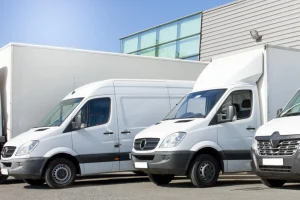Fleet insurance is a special type of coverage that you can get for multiple cars with one policy. It is often used by businesses that have a large number of cars, such as delivery services, taxi services, and other commercial enterprises. Fleet insurance allows businesses to save insurance time and money by covering all their cars under one policy instead of insuring each vehicle separately. This usually means lower rates and less work for the client. Fleet insurance usually covers several different risks, such as damage, theft, and liability for injuries resulting from an accident involving a company car.
1. How Fleet Insurance Works
Fleet insurance works in much the same way as personal auto insurance but covers a much larger number of vehicles. The policyholder (usually a company) provides information about the types of vehicles in their fleet, how they are used, and how many drivers each vehicle typically has. Insurers determine how risky a business is by looking at information such as the number of vehicles, goods transported, and driving records of employees. Once these factors are taken into account, the premium is determined. Fleet insurance differs from individual policies in that it allows a business to add or remove vehicles from the policy as needed. This provides more options and lower costs for businesses that are growing or changing.
2. Different Types of Coverage
Depending on the needs of the business, a fleet insurance contract can cover many different types of contents. Comprehensive third-party fire and theft insurance is the most popular option. Comprehensive insurance is the best protection because it covers both damage to fleet vehicles and liability for injuring others or damaging their property. Third-party insurance is usually the minimum required by law and provides compensation for injuries or damage to others. Third-party fire and theft insurance protects against damage from fire and theft but does not protect the car from other types of damage. Businesses can choose the amount of coverage that best suits their business and budget.
3. Who Should Insure Their Fleet?
Fleet insurance is ideal for businesses or groups that own more than one vehicle. Logistics, transportation, and distribution companies are examples of this. The same goes for businesses with a sales team or service personnel who need company vehicles. Even if a small business only has a few vehicles, fleet insurance is still useful because it saves them money and time compared to buying multiple individual policies. Even for non-profit organizations that use a large number of vehicles for community activities, work, or logistics, fleet insurance can be useful. The policy can be modified, expanded, or shortened to meet the needs of both small and large businesses.
4. Why Fleet Insurance is a Good Idea
Fleet insurance benefits businesses in many ways. Saving money is one of the best things. Discounts are often obtained when a business insures more than one car under one policy. This is because insurance companies consider bundled policies to be less risky than multiple individual policies. Another advantage is that it is easier to manage. A business can manage all of its vehicles with one fleet insurance policy. This makes it easier to renew your policy, process claims, and make policy changes. Fleet insurance also helps businesses plan their budgets better because they only have one renewal date and payment amount to worry about. Finally, fleet insurance gives businesses the freedom to add or remove vehicles as needs change.
5. Fleet Insurance for Different Types of Vehicles
Fleet insurance can cover many different types of vehicles, including cars, vans, trucks, and even taxis and construction equipment. There are different types of vehicles in a fleet, some more dangerous than others. This can affect the cost of insurance. The insurance needs and rates for a fleet of trucks used for long-haul transportation may be different than those for a fleet of commercial vehicles used for sales calls. To make a policy suitable for a vehicle, the insurance company will consider its purpose, value, and how it will be used. Businesses need to make sure their fleet insurance covers all the vehicles they use.
6. How Fleet Insurance Is Priced
The cost of fleet insurance depends on many factors, such as the number of vehicles, the type of vehicle, and the purpose of each vehicle. Insurance companies also look at the driving records of employees who drive vehicles. Companies with good safety standards, fewer accidents, and well-maintained vehicles may receive lower premiums. Prices are also affected by fleet size, as larger fleets often receive discounts by purchasing more products. Costs can also be affected by where the goods are being shipped, how far they need to be transported, and usually the mileage. By understanding these things, companies can take steps to reduce the cost of fleet insurance, such as starting a safe driving program and keeping their vehicles in good condition.
7. Driver Needs and Considerations
Fleet insurance typically covers all employees who are allowed to drive a company vehicle, but the insurance company may have specific rules for drivers. Some insurance companies only cover drivers who are over a certain age or have a good driving record. Businesses can reduce insurance costs by hiring only qualified employees, ensuring that drivers have a valid driver’s license, and providing regular training to drivers on safe driving practices. Some plans may also include “designated drivers,” which means that certain people are listed as the only ones who can drive. To ensure compliance and maintain coverage, businesses should ask their insurance company about their drivers’ standards.
8. How to File a Fleet Insurance Claim
The process for filing a claim for fleet insurance is generally the same as for personal auto insurance, but the process can be expedited for businesses that need to file a large number of claims at once. When an accident or damage occurs, businesses must notify their insurance company. They must include information about the cars involved, their drivers, and, if necessary, third parties. To evaluate the claim, the insurance company may also require photographs and injury reports. Having good internal processes for reporting incidents and obtaining the necessary paperwork can help businesses handle claims more efficiently and resolve issues faster, which means less disruption to business operations.
Conclusion
If your business needs more than one vehicle, you should consider fleet insurance. In addition to providing comprehensive coverage, it also makes management easier and can even save money. However, if businesses want to get the most out of fleet insurance, they should carefully consider their needs, implement strong security measures, and partner with a reliable insurance company. Businesses can protect their assets, employees, and overall operations by understanding the different aspects of fleet insurance. This will help ensure that their fleet remains an asset rather than a liability.
FAQs
1. What is Fleet Insurance?
Fleet insurance covers more than one vehicle under a single contract. This type of insurance is often used by businesses that own more than one company car. It saves money and makes it easier than insuring each vehicle separately.
2. Whose Fleet Can Be Protected?
Fleet insurance is generally available to any business or group that owns more than one vehicle. It is perfect for delivery services, taxis, construction companies, and other businesses that require more than one vehicle.
3. How many cars do you need to insure with fleet insurance?
Different insurance companies have different rules about the minimum number of cars they will cover. Some only cover two vehicles, while others require at least five vehicles.
4. What types of cars does fleet insurance cover?
Fleet insurance typically covers many different types of vehicles, such as cars, vans, trucks, and even some very specific types of equipment. The type of cover you need can depend on the type of vehicle and its purpose for operation.
5. What are the benefits of fleet insurance?
Fleet insurance usually comes in different types of cover, such as comprehensive cover, third-party only cover, third-party cover, fire cover, and theft cover. Businesses can choose a level of cover that suits their needs and budget.




